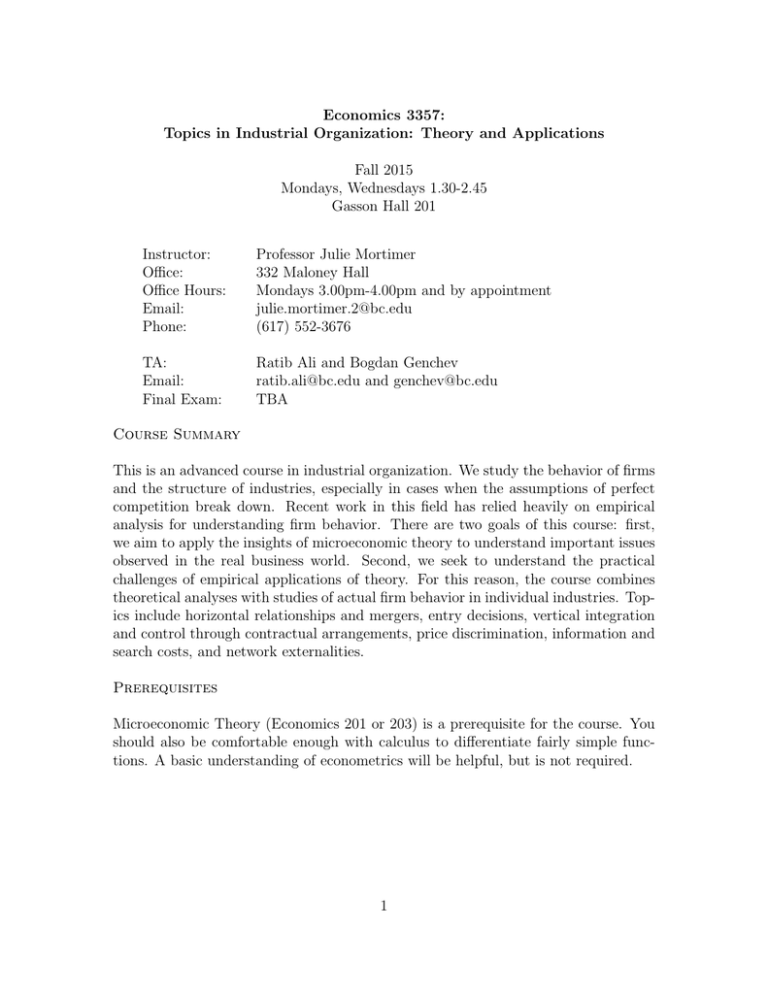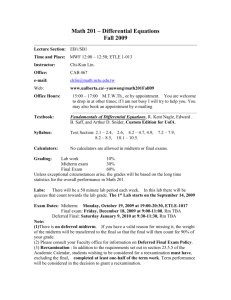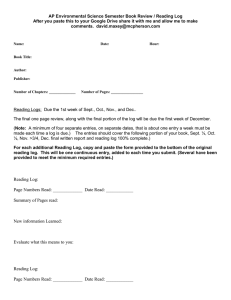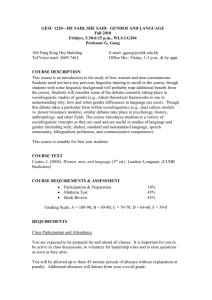Economics 3357: Topics in Industrial Organization: Theory and Applications Fall 2015
advertisement

Economics 3357: Topics in Industrial Organization: Theory and Applications Fall 2015 Mondays, Wednesdays 1.30-2.45 Gasson Hall 201 Instructor: Office: Office Hours: Email: Phone: Professor Julie Mortimer 332 Maloney Hall Mondays 3.00pm-4.00pm and by appointment julie.mortimer.2@bc.edu (617) 552-3676 TA: Email: Final Exam: Ratib Ali and Bogdan Genchev ratib.ali@bc.edu and genchev@bc.edu TBA Course Summary This is an advanced course in industrial organization. We study the behavior of firms and the structure of industries, especially in cases when the assumptions of perfect competition break down. Recent work in this field has relied heavily on empirical analysis for understanding firm behavior. There are two goals of this course: first, we aim to apply the insights of microeconomic theory to understand important issues observed in the real business world. Second, we seek to understand the practical challenges of empirical applications of theory. For this reason, the course combines theoretical analyses with studies of actual firm behavior in individual industries. Topics include horizontal relationships and mergers, entry decisions, vertical integration and control through contractual arrangements, price discrimination, information and search costs, and network externalities. Prerequisites Microeconomic Theory (Economics 201 or 203) is a prerequisite for the course. You should also be comfortable enough with calculus to differentiate fairly simple functions. A basic understanding of econometrics will be helpful, but is not required. 1 Course Requirements (Readings and Lectures) The required textbook for the course should be stocked at the bookstore. The text is: Oz Shy, “Industrial Organization,” Cambridge, MA: MIT Press, 1995. (Sixth Printing, 2001). Additional readings for the course will be available on reserve at the library or electronically. We will meet each week for two 75-minute sessions. Assessment Participation 10% Problem Sets 25% Midterm (October) 20% Final (Date and Time TBA) 45% You are responsible for all of the material presented in class and in readings. Class participation is required by everyone; this will occur primarily when we discuss actual industries and firm behavior. Problem sets will be collected at the beginning of class on the day they are due. The final is cumulative, and students will be given the max of .65*(final grade) or [.45*(final grade) + .20*(midterm grade)]. Late problem sets will not be accepted and there will be no makeup exams. Course Outline Chapter numbers refer to Shy. The class periods are roughly evenly split between lectures, with the appropriate chapter reference for the textbook; and discussion or ‘Industry Study’ sessions, which are denoted by “IS.” In most cases, we’ll be reading recent empirical work from the field. In order to aid in your class preparation for the Industry Studies, I will provide reading guides for our discussion papers. Students are expected to attend all classes, and to participate in the discussion sessions. 2 Week Date 1. Aug 31 Intro. to IO, Market Structure, Perfect Comp. Sept 2 Monopoly: P.D. and Durable Goods Sept 7 Labor Day Sept 9 IS: DVD pricing Sept 14 Homogeneous Goods Oligopoly (PS 1 DUE) Sept 16 IS: Imperfect Competition and Fish Sept 21 Collusion / Differentiated Products (Demand) Sept 23 IS: Railroad Cartel Sept 28 Differentiated Products (Supply) (PS 2 DUE) Sept 30 IS: Automobile Price Wars Oct 5 Guest Lecture: Michael Grubb on Adverse Selection Oct 7 Entry Oct 12 Columbus Day Oct 14 IS: Entry in Radio Oct 19 Mergers/Merger Guidelines (PS 3 DUE) Oct 21 Review: Sections 1.1-1.2, 2.1-2.3, 3.1-3.2, plus above Oct 26 In-Class Midterm Oct 28 IS: Merger Evaluation and Experimental Methods Nov 2 Vertical Control Nov 4 No Meeting Nov 9 IS: Contractual Arrangements in Home Video Nov 11 Network Effects, Tying and Bundling Nov 16 IS: Google Antitrust Actions Nov 18 Pricing Tactics & Information (PS 4 DUE) Nov 23 IS: L.A. Restaurants Nov 25 Thanksgiving Break Nov 30 IS: Auctions Dec 2 Advertising Dec 7 New Topics in Media Advertising Dec 9 Review (PS 5 DUE) 2. 3. 4. 5. 6. 7. 8. 9. 10. 11. 12. 13. 14. 15. Topic Reading 3 Ch 4.1-4.3 Ch. 5.1-5.5 Mortimer (2007) Ch 6.1,6.3-6.4 Graddy article Ch 6.5,7.1 Porter article Ch 7.3.1 Bresnahan article 2 articles Ch 8.1,8.3-8.4.2 Berry & Waldfogel article Ch 8.2,8.6 sections Vending presentation Ch 14.2, 14.3 Mortimer (2008) Ch 10, 14.1, 14.4 3 articles Ch 13.1-13.3, 16 Jin & Leslie article Lecture Notes Ch 11 Research Proposal Lecture Notes







